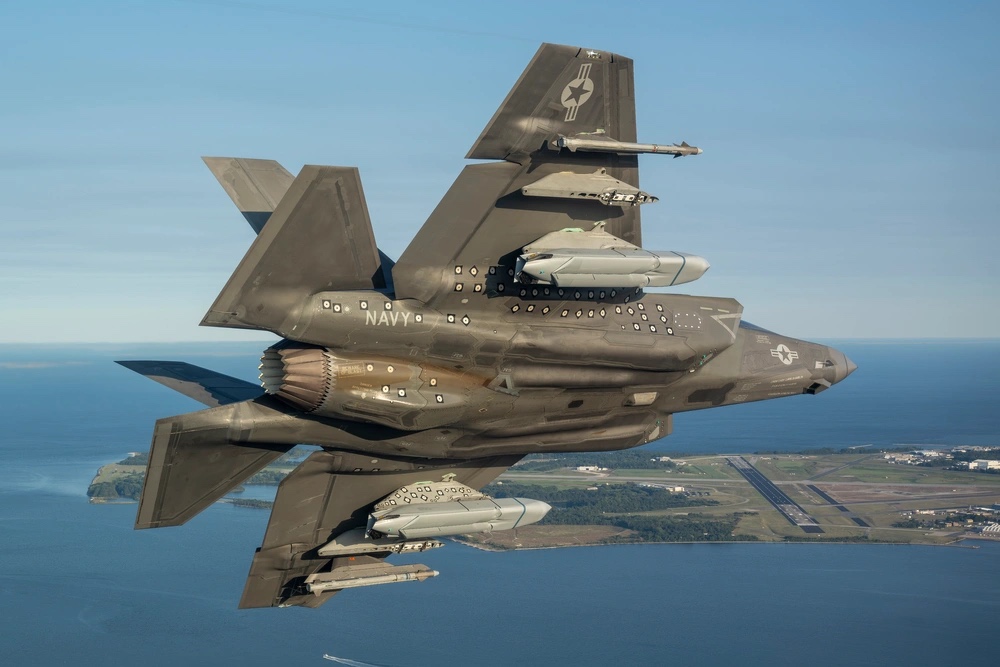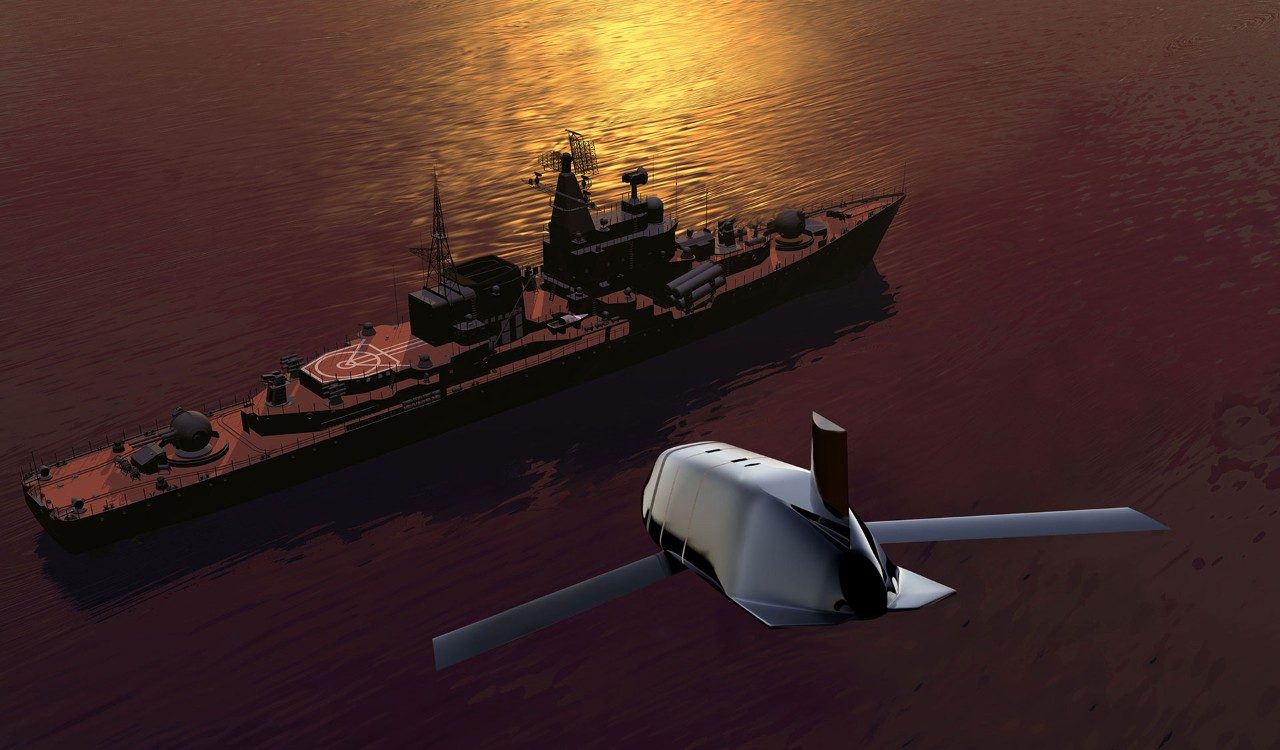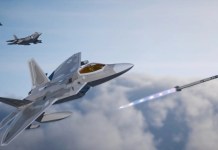The US F-35C Lightning II stealth aircraft has been spotted with the formidable AGM-158C Long-Range Anti-Ship Missile (LRASM) for the first time in a rare photo released by the Pentagon, as testing got underway in early September.
The Pentagon published the photo of the AGM-158C Long-Range Anti-Ship Missile (LRASM) being launched from Naval Air Station (NAS) Patuxent River, Maryland, from an F-35C test aircraft. The photo shows the F-35C equipped with two inert AIM-9X on the wingtips and two externally mounted LRASMs on the innermost hard points.
Produced by Lockheed Martin, the LRASM is described as “a cruise missile belonging to the AGM-158 family that offered a lethal, long-range, and extremely survivable capability against well-defended surface combatants that was unmatched by any other weapon in the arsenal.”
The missile has been derived from the AGM-158B JASSM-ER—a lethal stand-off weapon that the US Air Force (USAF) gloats about.
A statement accompanying the photo read that “the Pax River F-35 Integrated Test Force (Pax ITF) team flew two days of test flights to evaluate flutter, loads, and flying qualities with two AGM-158 loaded on external stations.”
The U.S. Navy began testing the LRASM anti-ship weapon on the F-35C earlier this month to assess the missile’s integration with the aircraft.
The caption of the photo further read: “LRASM is a defined near-term solution for the Offensive Anti-Surface Warfare (OASuW) air-launch capability gap that will provide flexible, long-range, advanced, anti-surface capability against high-threat maritime targets.”
The LRASM has been successfully installed and fielded on the B-1B and F/A-18E/F, and work on integrating it with the F-35 and P-8 aircraft has been underway for a long time now.
In fact, Lockheed Martin revealed artist images of an F-35 fitted with two LRASMs at the 2021 Surface Navy Association symposium. As Naval News reported at the time, the Navy released a pre-solicitation notice for the integration in July 2023.

The LRASM is expected to be integrated with the F-35B, in addition to the F-35C. However, due to their large size, none of these variants can carry the missile in their internal weapons bay.
While carrying missiles externally comes at the cost of stealth, it is regarded as a fair trade-off for the weapon’s long-range precision attack capabilities, especially since the threat of a war with China looms large.
The stealthy missile will give the F-35 a robust anti-surface warfare capability, which would be a valuable addition as the F-35 does not yet have a dedicated anti-ship missile.
LRASM Against China
The LRASM, derived from the AGM-158B JASSM-ER, was created by the Defense Advanced Research Projects Agency (DARPA) for the US Air Force and the US Navy. It was designed to lead the way in developing more advanced autonomous targeting capabilities than the US Navy’s Harpoon anti-ship missile, which has been in use since 1977.
This precision-guided intelligent anti-ship missile can intercept various surface threats while maintaining a safe distance and delivering a precise payload.
It is capable of semi-autonomous navigation to its target. With a minimum range of 200 nautical miles, the LRASM can be used to target aircraft, drones, hostile ships, land-based targets, and even shallow submarines.
LRASM technology reduces reliance on GPS navigation, network links, and ISR (intelligence, surveillance, and reconnaissance) platforms in hostile electronic warfare environments by allowing the weapon to use gross target cueing data to find and destroy its pre-defined target in denied environments.
Upon reaching the intended target, the missile initiates the terminal phase of flight by turning on an imaging infrared (IIR) seeker. The seeker finds targets and uses pre-programmed parameters contained in its threat target library database to classify them autonomously. Additionally, the sophisticated seeker ensures the missile hits the ship where it is most susceptible.

The stealthy AGM-158C is now available in two primary subvariants: the in-service C-1 and the still-under-development C-3, which is also called LRASM-Extended Range or LRASM-ER.
The latest integration of LRASM with F-35C comes months after the Navy launched four upgraded variant AGM-158C-3 Long-Range Anti-Ship Missiles (LRASMs) at once, describing it as a “graduation exercise for the latest configuration” of the stealth anti-ship missile.
The missile is anticipated to be one of the most important weapons in the United States’ arsenal against China if it launches an invasion of Taiwan.
The US Navy’s effort to arm its stealthy carrier-capable jet with LRASM may be an effort to expand its firepower for an Indo-Pacific confrontation. Unlike the US, China boasts of hypersonic anti-ship capabilities.
Given China’s strong anti-access and area-denial capabilities within the First Island Chain, long-range weapons are anticipated to be increasingly important in the early phases of the battle.
LRASMs will allow the US Navy to launch long-range strikes on high-priority maritime targets. Because of their capacity to detect and launch tactical strikes at long ranges, they will be crucial to combat operations in open seas and coastal waterways.
In recent years, the Air Force and the Navy have pushed for budgets that include significant multi-year procurement of LRASMs and other cutting-edge weapons.
The Navy and the Air Force have requested about $380 million in their respective Fiscal Year 2025 budget proposals to purchase 90 and 115 LRASMs, respectively. The Navy, for one, is looking to transition completely to the C-3 variant.
Both services view the anti-ship missile as an indispensable asset in the event of an armed conflict over the Indo-Pacific, and for this reason, by the end of the decade, they aim to have spent billions of dollars on over 1,000 LRASMs.
- Contact the author at sakshi.tiwari9555(at)gmail.com
- Follow EurAsian Times on Google News




